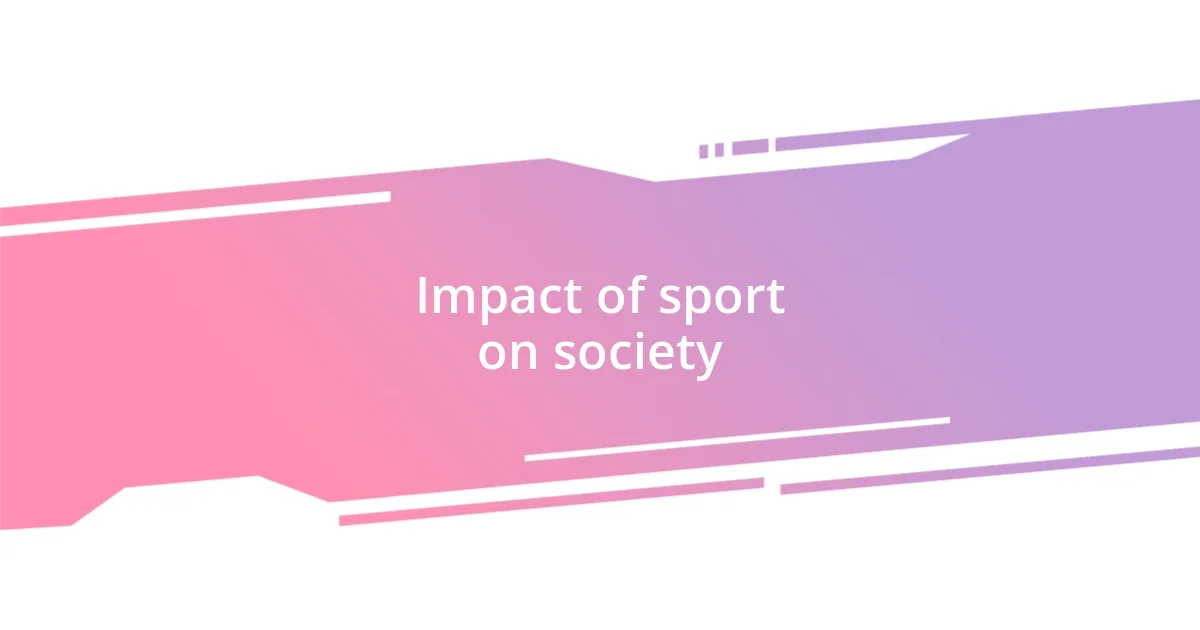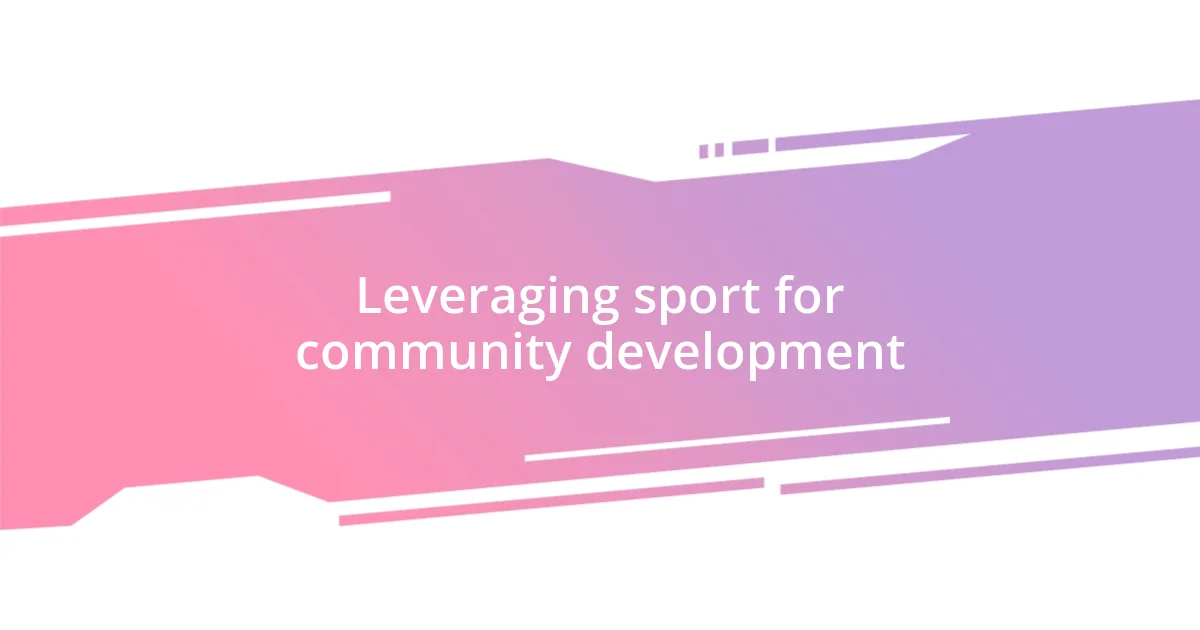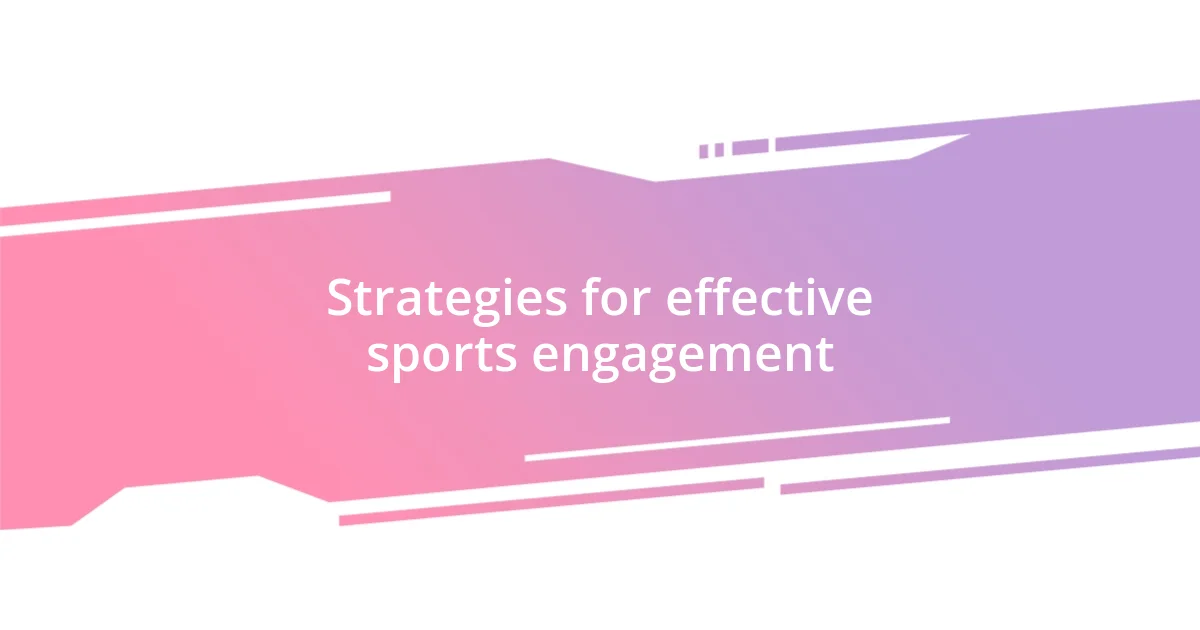Key takeaways:
- Sport unites individuals from diverse backgrounds, fostering friendships and cultural connections while promoting social inclusivity.
- Participating in sports enhances physical and mental well-being, teaching valuable life skills like resilience and teamwork.
- Community development through sports leads to economic benefits and serves as a platform for addressing social issues, inspiring collective action for change.

Defining sport as a catalyst
Sport serves as a catalyst for change, igniting personal growth and community transformation. I recall my first experience playing soccer in a local league; it was more than just a game. It fostered friendships and ignited my passion for teamwork and discipline. Have you ever felt that rush of adrenaline when working towards a shared goal? That moment embodies sport’s ability to unify and inspire.
Moreover, sport often acts as a bridge between diverse cultures and backgrounds. I vividly remember volunteering at an international sports camp where kids from various countries came together. Watching them communicate through game plays and laughter highlighted how sport transcends language barriers. Isn’t it fascinating how a simple activity can create bonds that might otherwise remain unformed?
Beyond personal connections, sport can drive social change, addressing issues like inequality and health awareness. Consider the impact of programs that use sports to empower underprivileged youth. I’ve seen firsthand how participating in a basketball initiative not only improved skills on the court but also instilled a sense of self-worth and community pride. When we think about the broader implications of sport, don’t we realize its profound ability to shape lives and societies?

Impact of sport on society
Sport profoundly influences society by cultivating a sense of belonging and fostering teamwork. I remember attending a community rugby match; it wasn’t just about the score but the collective cheers and encouragement from the stands. In that moment, I felt an overwhelming sense of unity. It’s incredible how a shared love for a game can galvanize entire neighborhoods, creating a spirit of camaraderie that spills into everyday life.
- Sport promotes social inclusivity, often bridging gaps between different cultures.
- It enhances physical and mental well-being, encouraging healthier lifestyles.
- Sporting events can trigger economic growth by attracting tourism and generating jobs.
- It serves as a platform for raising awareness on critical societal issues, like mental health or climate change.
- Sports can inspire activism, empowering athletes to use their voices for change.
The more I ponder the societal impacts of sport, the more I see how it reshapes our interactions and ambitions. When people come together for a shared objective, the resulting community spirit can often lead to amazing transformations that extend well beyond the playing field.

Benefits of sport participation
I’ve experienced firsthand how participating in sports can boost not just physical fitness but mental health too. After joining a running club, I noticed a significant drop in my anxiety levels. The simple act of lacing up my shoes and hitting the pavement became a form of therapy. Have you ever found solace in movement? For me, those early morning runs transformed my outlook on life.
Moreover, team sports have an incredible way of teaching life lessons. I recall a volleyball tournament where our team faced a crushing defeat. Instead of despair, we rallied together, learning that resilience and support can lead to growth. It’s remarkable how a setback on the court can mirror challenges we face off it, isn’t it? Sport participation cultivates not only skills but valuable lessons in grit and perseverance.
Lastly, engaging in sports fosters lifelong friendships. I cherish the bonds formed during weekend basketball games with friends, often reminiscing about our glorious wins and the hilarious blunders. These connections create a support network that extends beyond the playing field, enriching our lives in unexpected ways. How many friendships in your life have blossomed through shared interests? For many, sport acts as that binding thread.
| Benefit | Description |
|---|---|
| Physical Health | Participating in sports enhances fitness levels and reduces the risk of chronic diseases. |
| Mental Well-being | Engagement in sports helps alleviate stress and anxiety, contributing to overall mental health. |
| Social Connections | Sports create bonds between participants, fostering friendships and a sense of community. |
| Life Skills | Team sports develop skills such as teamwork, discipline, and resilience. |

Leveraging sport for community development
Sport serves as a powerful tool for community development in ways that extend far beyond the scoreboard. I recall volunteering at a local youth soccer camp; seeing kids from diverse backgrounds come together for just a few hours a week showed me how sports can break down barriers. Isn’t it amazing how a simple game can dissolve differences and spark friendships?
Economic opportunities also flourish from sporting events. When our town hosted a regional basketball championship, local businesses saw a noticeable uptick in customers. I remember the excitement in the air; restaurants were bustling, and hotels were fully booked. It’s clear that when communities leverage sport, they not only promote health but also create economic benefits that can uplift everyone.
Moreover, I’ve noticed that sports often serve as a stage for addressing community issues. During an annual charity run for mental health awareness, participants shared their personal stories, breaking the stigma and forging connections. Isn’t it powerful when athletes and the community join hands to advocate for change? This collaboration becomes a shared mission, inspiring more people to get involved and contribute to a better society.

Case studies of successful programs
One remarkable example of sport as a catalyst is the “Midwest Little League Baseball” program, which has transformed the lives of countless at-risk youth. I remember visiting one of their games and feeling the palpable energy from both the players and the cheering crowd. It was more than just a baseball game; it was an event that united the community, offering young athletes mentorship and a chance to develop critical life skills. Isn’t it inspiring how such a simple game can spur significant change in young lives?
Another impressive case is the “Girls on the Run” program, which encourages young girls to stay active while fostering confidence and self-esteem. I had the opportunity to attend one of their end-of-season 5k runs. Watching the girls cross the finish line—faces beaming with pride—was a testament to the program’s impact. Have you ever seen someone radiate joy and accomplishment like that? It’s experiences like these that melt the boundaries of age and background, proving that empowering the next generation can start in the most unexpected places.
Then there’s the “Street Soccer USA” initiative, which uses the beautiful game to empower homeless and disadvantaged populations. I recall discussing the program with one of the coaches who shared heartwarming stories of players who turned their lives around through soccer. Hearing about a player’s journey from living on the streets to competing on a national stage was both humbling and uplifting. Isn’t it amazing how sport can provide a pathway to hope and possibility for so many?

Strategies for effective sports engagement
To foster effective sports engagement, creating inclusive environments is key. I’ve participated in community basketball leagues where everyone, regardless of skill level, felt welcome. It’s incredible to see how a supportive atmosphere can motivate individuals to join in and contribute, transforming a simple game into a unifying experience. Have you ever felt that sense of belonging in a group?
Another successful strategy is involving local schools and organizations in sports initiatives. I remember organizing a neighborhood fun run that partnered with local schools to encourage families to take part. This collaboration not only boosted participation but also fostered camaraderie among parents and kids, pushing everyone to cheer for one another. Isn’t it rewarding to witness that spirit of teamwork extending beyond the field?
Utilizing social media can also enhance sports engagement tremendously. In my experience, sharing highlights and personal stories can create a ripple effect, attracting more individuals to participate. I recall posting photos from a community volleyball tournament on Instagram, and soon after, a few friends decided to form a team for the next event. It’s fascinating how just a little online motivation can spark interest in sports, wouldn’t you agree?














